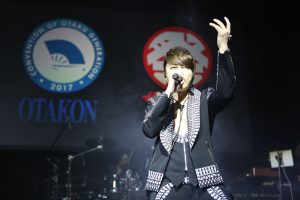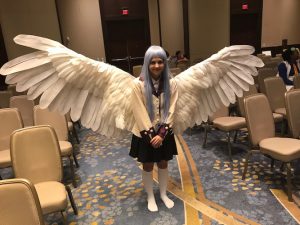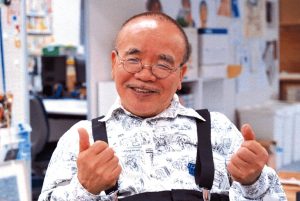The Otakon adventure was amazing; we met a lot of people and made new friends. Honey-chan did however, pull out her reporter’s notebook from time to time to do some interviews with some of the special guests at the convention. The Slants were one of those unique guests, covering topics like music, touring, social justice and going before the United States Supreme Court. The Slants are an Asian-American dance rock band founded by Simon Tam in 2006 in Portland, Oregon. They perform music most often compared to 80s synth-pop like Depeche Mode, New Order and Duran-Duran. The band is also known for taking stands on issues of social justice and racial identity. Honey sat down with Simon Tam, founder and lyrist, and Ken Shima, lead vocalist.
Honey's Anime
Simon Tam
Ken Shima
Question #1
We’ve heard your music described as “Chinatown Dance Rock.” What is that and how did the name come about?
We use the phrase “Chinatown Dance Rock” a lot because we like the way it sounds, and because for us it’s also a social commentary. Chinatown used to be the part of town where Asians used to be relegated to; they weren’t allowed to live in any other neighborhoods. But it was also the place that was safest for our communities. It [Chinatown] became a melting pot for pan-Asian cultures a lot like the way in which this band started with many Asian ethnic identities. I thought what a cool way to celebrate that.
We would describe the “sound” as 80s synth-pop music.
Question #2
You’ve done a lot of traveling as a band and we heard you did a tour of NATO military bases. What is your fondest memory of that tour?
It was an incredible honor to sing for soldiers overseas. We were playing at a base in the city of Pristina which is in Kosovo [in southeastern Europe]. The stage was outside in the winter so it was like twenty below and snowing. We were playing and at first there were maybe 15 or so people, just the U.S. soldiers. There aren’t a lot of people on this base. They were making such a ruckus, like dancing and screaming, that all of a sudden, the Germans were walking by popped in and were like “what’s going on here?”. Then the Bulgarians and Albanians followed, and then all these armies started flowing into this place and it was packed and a real fun dance experience. We ended up playing for two-and-a-half hours. A man introduces himself as the commander of the base and said "we’ve had so many acts here like Joan Jet and The Who but I’ve never seen anything like this you stayed until the very end and made sure every single person was thanked and you ate in our mess halls, so thank you. I normally only make an appearance then go back to my office and this time I stayed for the whole thing.”
Question #3
You talk a lot about social justice; how is that connected to your music?
We love using our art to bring attention to important causes. We all [the band] collectively wrote a song called “Anthem” calling for accountability in law enforcement so we [the United States] really can be a country with justice for each and every single person.
I think lyrics are the most powerful and resounding when it’s truth or when it’s coming from your own experiences. I think that’s why for us, [social justice and music] go hand in hand.
Question #4
Are you always trying to have messages in your music or is a song just a song sometimes?
I think it’s a little bit of both; art is unique in that way. When you write something there’s this philosophy that it’s not really your own anymore, that something takes place when a reader makes their own connection and it transforms into something else. I do think for us that sometimes, it is just a song. We write about relationships, in addition to justice and geek culture. Our music is kind of like our whole selves.
Question #5
Where did you start playing?
We started out in dive bars and punk rock venues, and we’re still playing them till this day. The fourth show we ever played was an anime convention. We’ve played anime conventions, weddings, houses, prisons, and military bases. We think music can be celebrated anywhere.
Question #6
Playing in a prison?
Yes, just like Johnny Cash. It is one of the most memorable moments of my life.
Question #7
The band went before the Supreme Court of the United States in the case of Matal v. Tam, arguing that the United States Trademark Office violated their rights in denying the trademark of their name saying it was offensive. The court sided with you and your band’s name goes down in history as changing the law of the land. What does that feel like to make such an impact?
Its humbling, it’s an honor, and it’s a lot of different things. I started this band because I wanted to provide a bold portrayal of Asian-American culture. I wanted to show others that we could take control of our voice our identity. The fact that we took that to the highest court in the land was a way to fulfill that dream in way I never could have imagined. At the same time, there are a lot of misunderstandings about our case, too. And it’s frustrating and there are a lot of people that are going to abuse the rights we fought for.
Question #8
What are your musical influences?
I think as a musician I would have to say it depends on my mood, on how I’m feeling that day. As a vocalist, I’d say Queen because Freddie Mercury, his vocal prowess is fantastic.
My favorite songwriter is Elvis Costello. I think he is an incredible lyricist; he packs a lot of emotion and is incredibly adept at taking on many different genres. My favorite band of all time is The Ramones because they’re awesome.
We really appreciate the chance to sit and talk with you about so many interesting things. Simon, Ken, your music makes us want to dance down the halls at the office. We hope you have a wonderful Otakon and you’ve definitely made yourselves some fans. Thank you.
Recommended Post
Anisong World Matsuri at Otakon 2017 Concert Review
Recommended Post
Otakon 2017 Field Report & Cosplay Photos
Recommended Post




